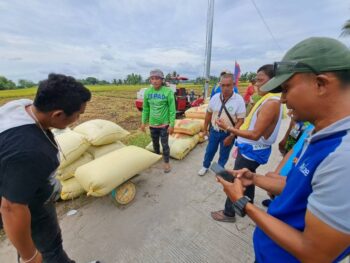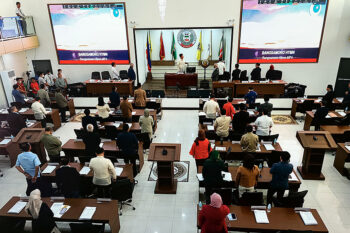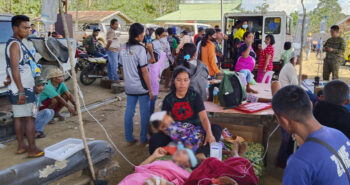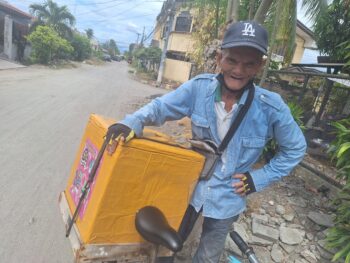
DAVAO CITY (MindaNews / 25 October) – It’s always a festival. “Look at this painting,” I said as I flashed a painting https://www.pinterest.com.au/pin/740208888724383912/ of a typical Filipino fiesta to my participants in a Psychological First Aid orientation course recently.
“Kids playing in the back, the nanays preparing food under the mango tree, the tatays downing a few bottles here and there, waiting for more pulutan to come.”
Playing a short game of spot-the-Pinoy for a while, we picked out the most Pinoy of symbols that color the picture. A guitar is depicted to show that this is going to be a musical affair. Bottles of beers all over the place, with a man carrying two cases of what looks like beer ala Atlas, condemned to hold the heavens and sky for eternity. Two heavy cases are a sacrifice anyone would make to make an entire community happy – and now we know why the liquor ban hits us as hard as it makes perfect sense, but I digress.
It’s always a festival. “I don’t even think everyone knows each other in this scene, but everyone is comfortable,” I muttered as I fell into a five-second trance that took me back to my summer vacations in Bohol back in the ’90s, where strangers are invited to dine in the household dining table during fiestas. “This is a painting of a fiesta, which could also be a painting for, say, a birthday, a reunion, a wedding, or even a simple thanksgiving gathering.”
“But also think about this, you cannot be wrong if you say that the same painting is a depiction of family visiting a sick loved one. Or a funeral.” It’s always a festival, even in the most difficult times.
Teaching the concept of Social Supports to fellow Filipinos is easy. Show them that painting and ask them what they miss the most. The concept is ingrained in our collective psyche that the mere mention of the concept of social support makes everyone remember a fond memory or two from their childhood. It makes you smell your Lola’s trademark kakanin, or the distinct sound of your Lolo’s ancient motorcycle. The sensations are familiar and comforting. They bring you back home.
That, or they make you feel like home even if you are in some strange place. This is something that my audience understands very well. They are, after all, personnel from government agencies and partner private institutions tasked to take care of repatriated overseas Filipino workers. We had people from the Department of Tourism, spearheading the event which was attended by people from the Overseas Workers Welfare Administration, Bureau of Quarantine, the Coast Guard, and Civil Aviation Authority of the Philippines to name a few. The private sector was represented by personnel from multi-use hotels that now serve as quarantine and isolation facilities in this pandemic.
They were in the meeting to learn about Psychological First Aid, a procedure that they can use as they continue to cater to repatriated OFWs. Their mission reeks of complexity, but my wandering imagination refused to face the daunting task head on. “This is in preparation of a grand homecoming,” I thought to myself, somehow finding a way to break down their enormous task in its most basic element. I started to imagine a marching band, with masked musicians, their faces shielded by a flimsy film of plastic that resembles the Filipino spirit: bends but never breaks! The majorettes clad in colorful PPEs with their meter-long batons – multipurpose tools for keeping the band tempo while helping enforce distancing rules. The concept in my head is so ridiculous to the point of becoming insulting; the picture of a quintessential Filipino festival has truly become an aberration these days.
“Your presence in itself is already a form of psychosocial intervention,” I tell the participants. It is not just the structures and systems in a community that make up social supports. Social supports also include the comfort you get from your family and friends, in physical terms as when people prepare a room for you to stay in while serving your 14-day quarantines, or in emotional form, as when people call you up just to make sure every need is met.
“The Filipino sense of hospitability has always been at the bedrock of our tourism industry; some form of psychosocial intervention we have afforded to the rest of the world.” I could sense a few of them nodding in agreement, with a few expressing their affirmation via Zoom chat. “This is how the pandemic has hit us the hardest, we cannot simply make others feel the warmth of home,” a paradox considering the time we have spent being stuck in our respective residences.
“When DOT contacted us for Project Hope, I never hesitated,” I was winding down to some sort of a dramatic ending now. “I volunteered as a form of gratitude to all of you, unsung heroes working tirelessly in the background.” This is no lip-service, my wife Blessie is in government service too. She has lost friends at work due to the virus. She takes calls even on Saturday and Sunday nights, coordinating swabbing schedules for close contacts at work. At times she is the one to break the bad news: “I am sorry, but the result came back positive” is a line I have heard her say over the phone several times now.
“I understand the sacrifice and thank you for all the little things you have done to comfort others in this difficult time. Three months ago, I was in a position where I needed your support, and you gave it your all.”
When my three-year-old daughter Pia and eight-year-old son Sergio tested COVID-19 positive back in June 2021, they were sent to an isolation facility not far from home. Blessie was isolated with them despite testing negative for the virus. Funnily enough, the kids felt like they were in vacation. Our messenger video calls were filled with scenes of chaos. Kids jumping on top of the bed, running around in the hotel room, Blessie completely puzzled and perplexed on how to make them behave.
The hotel staff were very accommodating all the while, Blessie said. They were able to provide everything the kids needed. While it felt like the longest 10 days I have ever spent at home in quarantine, I am sure it seemed like a short-lived staycation to the kids: fleeting and dreamy, as all vacations should.
When they were released from the facility, my sister Elly – who was on vacation at that time – prepared a simple signage for the kids. In a matter of seconds, the message became a freedom board of Star Wars stickers and random pen marks. Their Lola Nida was busy in the kitchen preparing some merienda. Lolo Jimmy was waiting at the doorstep to greet them, “Welcome Home!” See, it’s always a festival. (Randolph R. Reserva for MindaNews)
(Randolph R. Reserva is a licensed counselor employed on the teaching staff of the Ateneo de Davao University Department of Psychology. He trains for Psychological First Aid in Times of Disasters and Emergency Situations. He is currently completing his studies for the degree of PhD in Counseling Psychology.)







